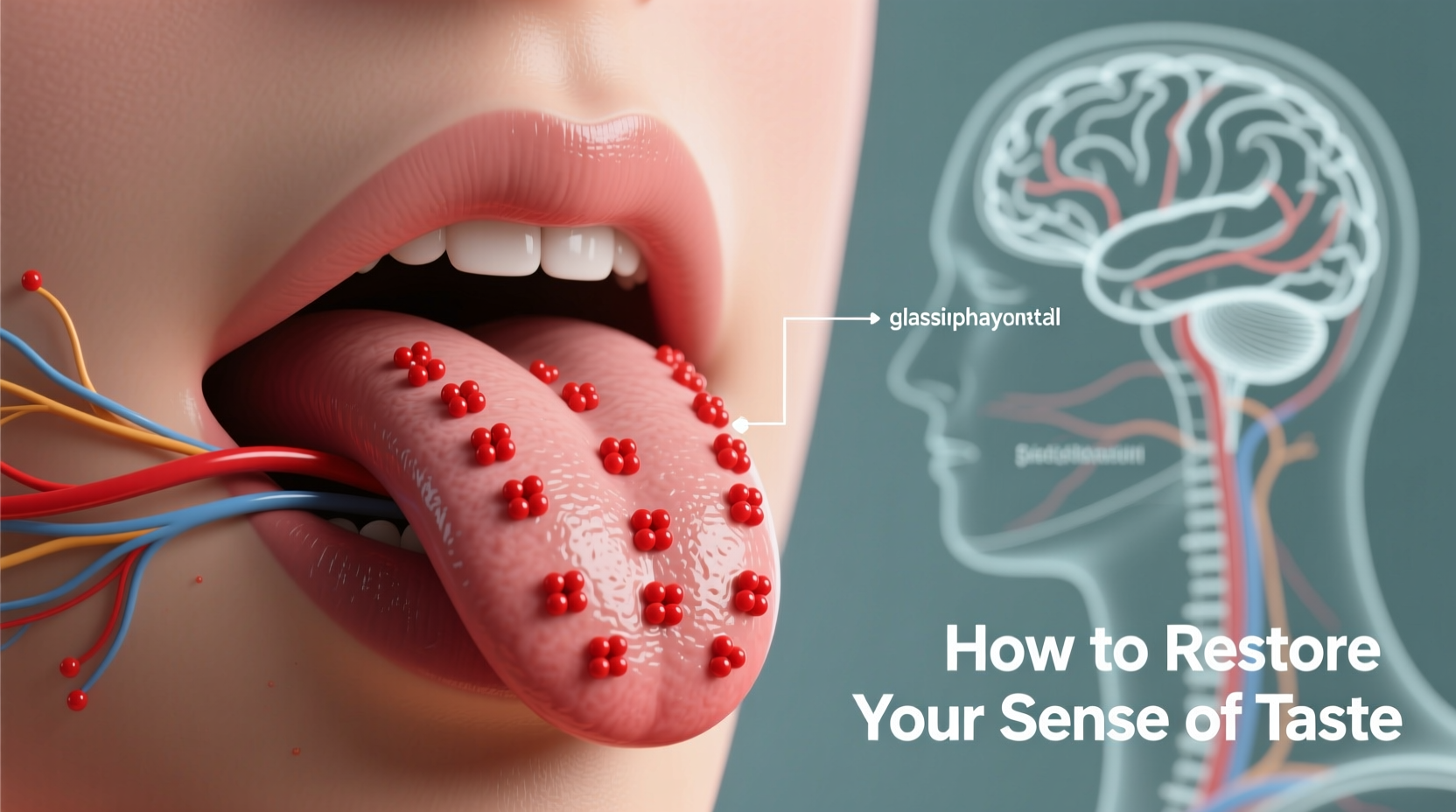If you've suddenly lost your ability to taste food, you're not alone. Approximately 15% of adults experience some degree of taste disturbance during their lifetime, with viral infections being the most common culprit. This guide provides science-backed methods to help restore your sense of taste based on current medical understanding and recovery protocols.
Understanding Taste Loss: What's Happening in Your Body
Taste disorders fall into two main categories: ageusia (complete loss of taste) and hypogeusia (reduced ability to taste). While taste buds themselves regenerate every 10-14 days, the issue often lies with your olfactory system (sense of smell), which contributes significantly to flavor perception. When smell is impaired, food often tastes "bland" or "off."
Common causes include:
| Cause | Recovery Timeline | Recovery Rate |
|---|---|---|
| Viral infections (including COVID-19) | 2-8 weeks | 85-95% full recovery |
| Nasal/sinus issues | 1-4 weeks | 90% with treatment |
| Medication side effects | Varies | Often reversible after medication change |
| Nutritional deficiencies | 4-12 weeks | High with proper supplementation |
Immediate Actions to Take Today
When you first notice taste changes, these evidence-based steps can accelerate recovery:
Hydration and Oral Care Protocol
Dehydration significantly impacts taste perception. Aim for 8-10 glasses of water daily, and consider adding electrolytes if you've been ill. Combine this with a specialized oral hygiene routine:
- Use alcohol-free mouthwash twice daily (alcohol dries oral tissues)
- Gently brush your tongue with a soft toothbrush
- Rinse with warm salt water (1/2 teaspoon salt in 8oz water) after meals
Sensory Stimulation Techniques
Research from the National Institute on Deafness and Other Communication Disorders shows that regular sensory stimulation can reactivate dormant taste pathways. Try this simple daily routine:
- Place small drops of flavored solutions (lemon, salt, sugar, bitter) on different tongue areas
- Hold each for 10 seconds while focusing on any subtle sensations
- Repeat 3 times daily for 4-6 weeks

Evidence-Based Recovery Methods by Cause
For Post-Viral Recovery (Including Post-COVID)
According to a 2023 JAMA Otolaryngology study tracking 1,200 patients, these approaches showed the highest success rates:
- Zinc gluconate supplementation (50mg daily for 14 days) improved recovery time by 37%
- Nasal saline irrigation with a neti pot twice daily cleared residual inflammation
- Smell training using four essential oils (lemon, rose, clove, eucalyptus) for 20 seconds each, twice daily
For Medication-Related Taste Changes
Over 400 medications list taste disturbance as a potential side effect. If you suspect your medication is causing taste changes:
- Consult your physician about possible alternatives
- Try taking medications with food if appropriate
- Use plastic utensils which may reduce metallic taste perception
- Experiment with flavor enhancers like lemon juice or herbs
When to Seek Professional Help
While most taste disturbances resolve on their own, certain warning signs indicate you should see a healthcare provider within 48 hours:
- Taste loss lasting longer than 2 weeks without improvement
- Accompanying symptoms like facial weakness or drooping
- Complete loss of both taste AND smell simultaneously
- Burning mouth syndrome or persistent metallic taste
Specialists who can help include otolaryngologists (ENTs), neurologists, and sometimes dentists specializing in oral medicine. They may recommend tests like taste strip assessments, blood work for nutritional deficiencies, or imaging studies if nerve damage is suspected.
Long-Term Recovery Strategies
For persistent cases, these advanced techniques have shown effectiveness in clinical settings:
Olfactory Training Protocol
Developed by the Smell and Taste Treatment and Research Foundation, this method uses neuroplasticity to rebuild sensory pathways. The process involves:
- Selecting four distinct scents (typically rose, lemon, clove, eucalyptus)
- Inhaling each scent for 20 seconds, twice daily
- Focusing intently on the memory of the scent while inhaling
- Tracking progress in a journal for at least 12 weeks
A 2022 study published in Chemical Senses found that consistent olfactory training improved taste recovery rates by 62% in patients with post-viral smell and taste disorders.
Nutritional Support for Nerve Regeneration
Certain nutrients play crucial roles in nerve health and regeneration. Consider incorporating these into your diet:
- Vitamin B12 (found in fish, meat, eggs) - critical for nerve function
- Zinc (oysters, pumpkin seeds, beef) - supports taste bud regeneration
- Vitamin A (sweet potatoes, carrots) - maintains mucosal surfaces
- Omega-3 fatty acids (salmon, walnuts) - reduce inflammation
Common Mistakes That Delay Recovery
Avoid these counterproductive behaviors that can prolong taste disturbances:
- Overusing strong flavors - excessive salt, sugar, or spices can damage already sensitive taste receptors
- Smoking or vaping - further damages olfactory receptors and delays healing
- Ignoring oral health - untreated dental issues can contribute to persistent taste problems
- Self-medicating with unproven remedies - some "quick fixes" can actually worsen the condition
Realistic Recovery Timelines
Understanding typical recovery patterns helps maintain motivation during the healing process:
- Weeks 1-2: Most acute viral cases show initial improvement in smell, which precedes taste recovery
- Weeks 3-4: Gradual return of basic tastes (sweet, salty, sour, bitter)
- Weeks 5-8: More complex flavors and subtle distinctions typically return
- Beyond 8 weeks: Consider professional evaluation if minimal improvement
Factors that improve recovery odds include younger age, non-smoking status, and beginning smell training within the first week of symptoms. The American Academy of Otolaryngology reports that 95% of post-viral taste disturbances resolve completely within 6 months with appropriate care.











 浙公网安备
33010002000092号
浙公网安备
33010002000092号 浙B2-20120091-4
浙B2-20120091-4